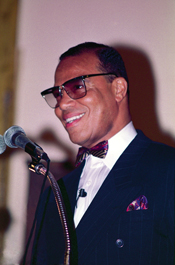JABRIL.MUHAMMAD
[Editor’s Note: This article is reprinted from Vol. 35 No. 34]

Study the Honorable Minister Louis Farrakhan’s words in the book titled “Closing The Gap.”
**********
From this point through the last interview you will notice that they are not placed in chronological order. Instead I attempted to place them according to subjects. This could not be done perfectly because a few of the interviews contain more than one subject.
As you notice this section of the book started with Minister Farrakhan’s answer to my question regarding conversation, in addition to the reason that I gave for starting this section with that interview. I’m also expressing my hope that his beautiful and wise answer stimulates the highest order of conversation on every subject on which we engage. But especially regarding this book, it’s my hope that the readers of this book engage each other with the best kind of conversation concerning the Honorable Minister Louis Farrakhan, whose person and works merit conversation on the highest level.
On June 10th the Honorable Minister Louis Farrakhan told me that he turned to a religious channel and heard a preacher speaking of a man, in an interesting way named Jabez. He asked me if I had ever heard of him. I said “No sir.”
After some discussion I told him I would do some research on him. The next day I gave him I Chronicles 4:9-10.

The Bible has this on Jabez. I Chronicles 4:9-10, “And Jabez was more honorable than his brethren, and his mother called his name Jabez saying, ‘Because I bore [him] with sorrow.’ “And Jabez called on the God of Israel, saying, ‘Oh that thou wouldst bless me indeed, and enlarge my border and that Thy hand might be with me, and that Thou wouldst keep me from evil, that [it] may not grieve me!” And God granted him that which he requested.”
This is the comment that the Honorable Minister Louis Farrakhan made on him the next day, June 11th.
This is what I wanted to say about Jabez: That the different variations of interpretations or translations of scholars.
Minister Farrakhan: She bore him in sorrow and she bore him in pain. His prayers that pain will not afflict him. God answered his prayer, he was spared from that. It’s not quite proper in the translation.
But my mother bore me with pain and sorrow, because she tried to abort me three times. Because she was living with my brother’s father but my father whom she married and never divorced came back into her life momentarily and she became pregnant with me.
So all the time she was carrying me, she was in sorrow, because she tried to kill me, and then she decided to have me. You don’t do that unless you are in pain. And the pain and fear of what the child would look like that he who she was living with (my brother’s father) would become aware that her husband had slipped back in and had an affair with his wife who had left him but was living with my brother’s father. So she bore him in sorrow.
She bore him in pain and she bore him in fear and she bore him in great insecurity. And she therefore, became very committed in prayer that God would save her–her life; her relationship with the man. So she was prayerful out of great insecurity. But I think the prayer of Jabez was not that he should not be afflicted with pain.
But that in his life, whenever he did something that was not right or proper, that he would be delivered from the consequences of his actions that he took, that in his heart, he believed was not right and the prayer of relief from affliction; but he’s afflicted.
It’s not seeking relief from affliction; it’s not seeking relief from the pain that accompanies the mission but it’s seeking God’s blessing on him that when he does that which in his own mind he thinks is not correct then God would deliver him from the pain of the consequences of whatever it was that he thought was not correct.
I remember when I was the minister in New York; they had a lot of charges, different charges on me. And one day the Messenger, I was told got tired of hearing talks about me. And he said to them, “Brother a man that preaches like that has no sins.” I don’t know what they thought about that, but when I heard it, it is not that he doesn’t have sins, but the goodness of his work and his heart and his intentions is such that it is as though he has no sins, because God would not bring upon him the consequences of his sins.
That’s coming back to Jabez and those of us favored by God. We live in a world where no one can get through a world like this without sin; no one. And yet He holds His prophets guiltless; sinless.
But if we did not have sin what would be the need for Allah to have the attribute of mercy, or say that He is the Oft-returning to mercy, the Forgiving?
Well if His servants the Prophets stand in His grace; stand as recipients of His mercy and as recipients of His forgiveness, this is the path of favor that we are asked to pray for, “Oh Allah guide me on your straight path, the path of those upon whom you have bestowed favor.” What greater favor is that that He would enlarge; expand your territory and keep you free from pain or affliction, because of any inadequacies that you may have.
I felt great kinship with Jabez and I know it’s not there accidentally. It’s there because of a prophet, the messenger of God, the Messiah His helper and helpers and people that are to be the recipients of God’s mercy and we are coming to Him through pain; through great affliction; great suffering even though He has chosen us and we have chosen Him, yet we have fallen short of the glory of God.
We stand in need of His mercy; His grace; His forgiveness. And we pray that He will not afflict us with the pain that we deserve for our errant ways. So the prayer that the Messenger asked us to pray, “Oh Allah, punish us not if we forget or make a mistake. Don’t lay on us the burden that thou didst lay on those before us.”
That’s the comment that I wanted to make on Jabez and how I relate to him, the prayer that he prayed, the pain of his mother, and the meaning of his name. What did they say that name meant?
Jabril Muhammad: Sorrow.
Minister Farrakhan: Sorrow. Well I did say he was acquainted with grief. A man of sorrow, acquainted with grief. Isn’t it the way it reads?
Jabril Muhammad: Yes.
More next issue, Allah willing.












